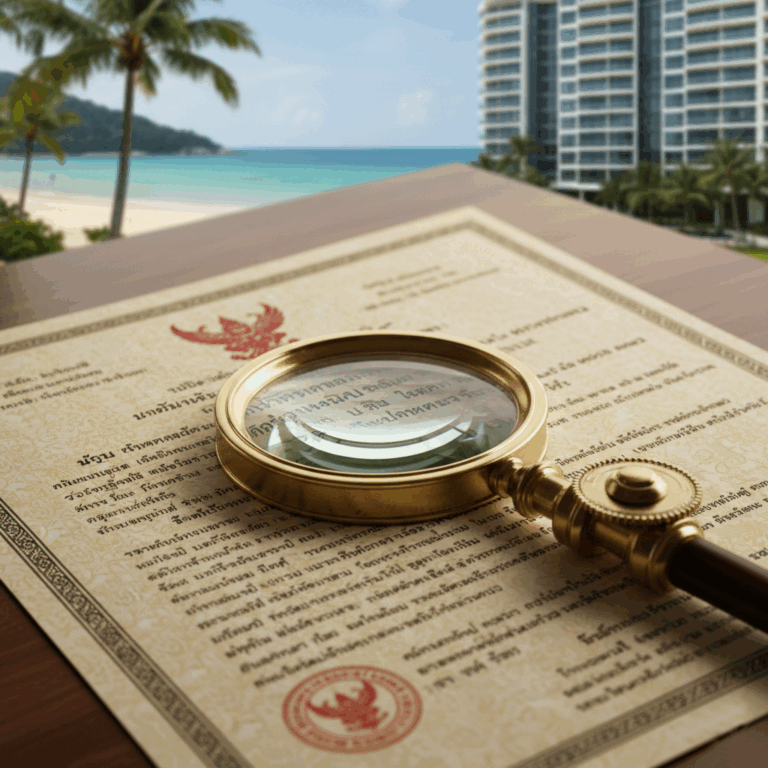Due Diligence: A Must for Foreign Property Buyers in Thailand

by Anthony Justice
Thailand appeals to a wide range of nationalities with its stunning beaches, contemporary condominiums, and investment opportunities. However, many foreign buyers are unaware of the practical and legal pitfalls that lie behind the inviting prices and glossy brochures. As a consultant who frequently deals with foreigners purchasing real estate in Thailand, I have seen two kinds of clients: those who conduct due diligence and those who regret not having done their research. My goal is to help you avoid unpleasant surprises. Due diligence is not an optional step here—it’s your main protection.
Recognizing the Actual Risks
The property market in Thailand doesn’t work quite the same way as it does in many other countries. Yes, foreigners can legally own condominium units, but owning land is a different story with strict limitations. That’s why many buyers end up exploring long-term leases, company setups, or usufruct arrangements — each of which comes with its own set of rules and fine print.
Because of all these layers, things can easily go wrong when someone jumps into a purchase too quickly. I’ve seen buyers rely on friendly assurances, assumptions, or a smooth-talking agent, only to discover problems later on. Some found out the title deed didn’t match what was registered at the Land Office. Others learned that their building had already reached the foreign
ownership quota, that construction permits were missing, or that the property they bought was carrying someone else’s debt. These situations are far more common than many people think, and they’re exactly why due diligence is so important. These issues might have been avoided by carrying out appropriate due diligence prior to completing the transaction. When we do due diligence for clients, our main aim is straightforward: to make sure the property you’re planning to buy is truly what it appears to be, without hidden issues.The process typically includes:
Verification of Title Deeds
We go to the Land Office to check the property’s title deed. This lets us confirm that the seller genuinely owns the property and has the clear right to transfer it to you.
Check for Encumbrance and Liability
Properties in Thailand can come with mortgages, liens, leases, usufructs, or other registered rights attached to them—and these don’t simply vanish when the property is sold. We make sure you’re not unknowingly taking on someone else’s debt or obligations when you buy.
Review of Foreign Ownership Quota (for Condos)
By law, foreigners can own only up to 49% of the total sellable area of a condominium project. Many buyers are unaware of this—and end up unable to register their purchase even after paying. We verify available quota before anything is signed.
Background Check for Developers or Sellers
We check the developer’s track record, completed projects, and any financial issues or disputes. We check resale units for any legal cases, bankruptcy concerns, or irregularities involving the seller.
Zoning and Building Permits
We verify that building permits, land use approvals, and environmental requirements are met for homes, villas, or off-plan projects. This step is crucial for avoiding demolition orders or unregistrable structures.
Reviewing Contract
To make sure your rights are adequately safeguarded, we review the contract to ensure they are legally binding, transparent, and do not contain unfavorable terms that could put you at a disadvantage.
Why Due Diligence Is Even More Important for Foreign Buyers
Foreign investors often turn to agents, friends, or sellers for information. But if anything goes wrong later, the Thailand’s legal system places responsibility on the buyer—not the seller.
Additionally, foreign buyers must comply with specific rules such as:
• Sending money from overseas correctly to obtain the Foreign Exchange Transaction Certificate, which is required to own a condo.
• Making sure that leases are properly registered to be enforceable.
• Avoiding unlawful nominee arrangements when buying land.
A minor error in any of these areas could result in the loss of ownership rights or prevent resale.
My Professional Recommendation
If you plan to buy property in Thailand—whether it’s a condo, villa, or land lease—engage a qualified Thai lawyer or consultant before paying a deposit. A developer may tell you everything is fine, but due diligence should always be handled independently. The cost of the due diligence itself is much less than the peace of mind you get from knowing your investment is legal and safe.
